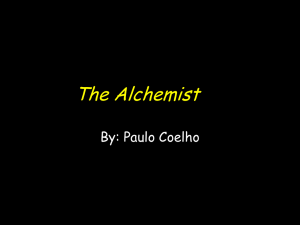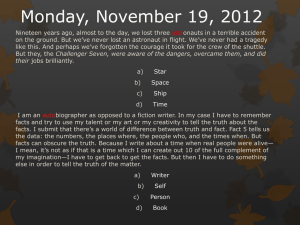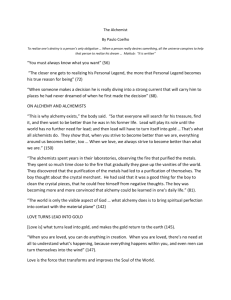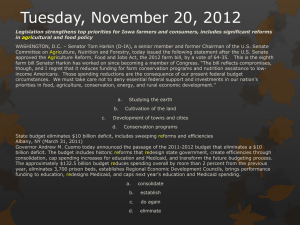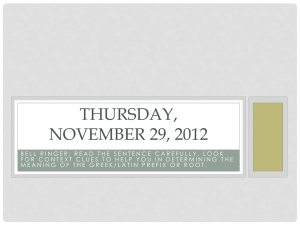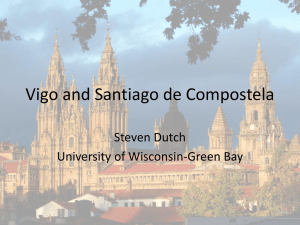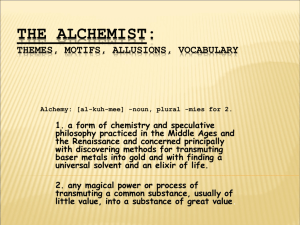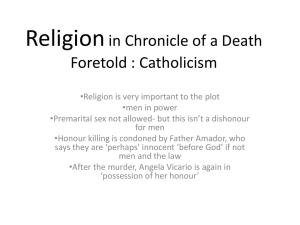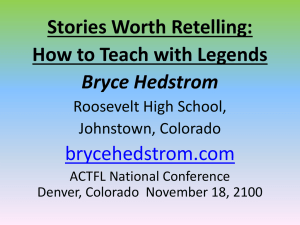Themes, Motifs and Symbols in The Alchemist
advertisement
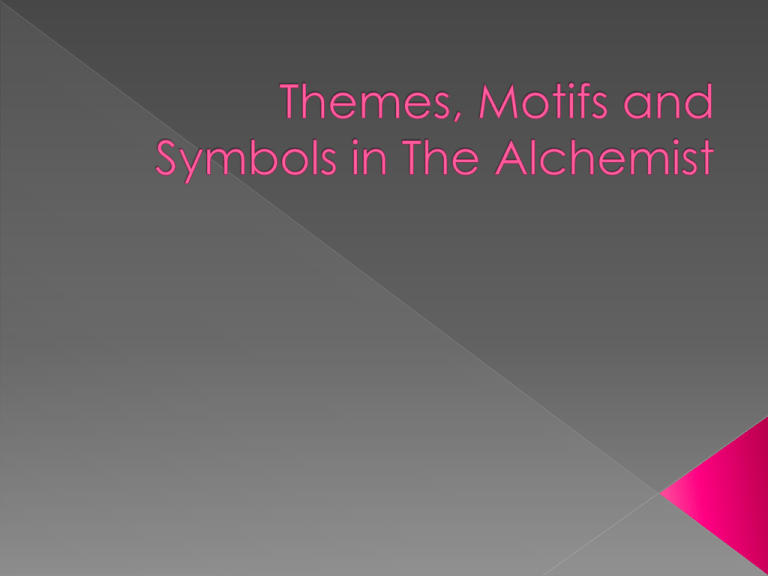
Theme: /theem/ -noun 1. a subject of discourse, discussion, meditation, or composition; topic: The need for world peace was the theme of the meeting. 2. a unifying or dominant idea, motif, etc., as in a work of art. Fate is constantly intertwined with will. A key theme of the book focuses on how much in life is under one's control, and how much is controlled by fate. The old king states that the world's greatest lie is that "at some point during our lives, we lose control of what's happening to us, and our lives become controlled by fate." Love is described as a part of the Soul of the World. Love occurs in life and Nature. As everything supports each other, they love each other. Many examples of Love occur in the later parts of the book which we will discuss then (I don’t want to ruin it for you!) Controlled Luck The theme of controlled luck is prominent in this book, as the old king and the alchemist both tell Santiago about how if one really wants to fulfill his or her Personal Legend, the whole universe will conspire to help make it happen. Coelho refers to this as the idea of "beginner's luck", or the concept of favorability. Santiago is blessed with beginner's luck, when he decides to go to Africa. He manages to sell all of his sheep very easily, and is given "a taste of success" that whets the appetite to fulfill one's Personal Legend. Spiritual Enlightenment In The Alchemist, a kind of spiritual enlightenment is accomplished by fulfilling one's Personal Legend, and adding to the Soul of the World, which is the "light" of most religions. The spiritual influence of this book is omniscient, for example in Santiago's "turning himself into the wind" stunt. He learns the Language of the World, which is basically the language of the Soul of the World. As the Soul of the World is related to the Soul of God, Santiago is able to perform miracles after he has reached into the Soul of the World. Omniscient: [om-nish-uhnt] adjective 1. having complete or unlimited knowledge, awareness, or understanding; perceiving all things. –noun 2. an omniscient being. 3. the Omniscient, God. Motif: [moh-teef] -noun 1. a recurring subject, theme, idea, etc., esp. in a literary, artistic, or musical work. 2. a distinctive and recurring form, shape, figure, etc., in a design, as in a painting or on wallpaper. 3. a dominant idea or feature: the profit motif of free enterprise. Omen: [oh-muhn] -noun 1.anything perceived or happening that is believed to foresee a good or evil event or circumstance in the future. Being able to observe and read omens is a key motif throughout the book. The Old King sees a butterfly and recognizes it as a good omen for Santiago’s journey. The crystal merchant of Tangier recognizes Santiago's presence in the shop as an omen, as two customers came into the shop as he was cleaning the crystals for the merchant. Personal Legend The Personal Legend is a being's reason to live. Everything in the world has a Personal Legend, and by reaching one's Personal Legend, one adds to the Soul of the World, the purity of the world. Santiago’s “PL” is obvious, to find his treasure at the Egyptian pyramids. The Tarifa baker's Personal Legend is to travel the world. The Personal Legend of a person surfaces at childhood, and one can never find true happiness without fulfilling it. The Personal Legend of Santiago drives him to his treasure as he chooses to accomplish his Personal Legend Others, like the Tarifa baker choose to ignore the Personal Legend, and thus shape their life to be forever wanting. Allusion: [uh-loo-zhuhn] -noun 1. a passing or casual reference; an incidental mention of something, either directly or by implication: an allusion to Shakespeare. 2. the act of alluding. 3. Obsolete. a metaphor; parable. Statue of Melchizedek. Santa Maria Maggiore, Rome. In the Tanakh (part of the Hebrew bible), Melchizedek brought bread and wine to Abraham after Abraham's victory over the four kings (led by Chedorlaomer) who had besieged Sodom and Gomorrah and had taken Abraham's nephew, Lot, prisoner. Melchizedek is also described as blessing Abraham in the name of El Elyon (God), and in return for these favors, Abraham gave Melchizedek a tithe, from the spoils gained in the battle. Meeting of Abraham and Melchizedek by Dieric Bouts the Elder, 1464-1467 Tithe: [tahyth] noun, verb, tithed, tith·ing. -noun 1. The tenth part of agricultural produce or personal income set apart as an offering to God or for works of mercy, or the same amount regarded as an obligation or tax for the support of the church, priesthood, or the like. In The Alchemist, Santiago must twice pay one-tenth of his possessions. In the first instance, he pays one-tenth of his flock; in the second, he pays one-tenth of his treasure. In the Biblical reference, Abraham pays Melchizedek one-tenth of his battle winnings in exchange for being blessed in the name of God. Santiago The Way of St. James or St. James' Way, often known by its Spanish name, el Camino de Santiago, is the pilgrimage to the Cathedral of Santiago de Compostela. A major Christian pilgrimage route. Paulo Coelho made the journey and wrote about it in the book called The Pilgrimage in 1987. The Philosopher’s Stone The philosopher's stone is a legendary substance, supposedly capable of turning inexpensive metals into gold; it was also sometimes believed to be a means of making people younger. For a long time it was the "holy grail" of Western alchemy. The first book in J.K. Rowling’s Harry Potter series is entitled, Harry Potter and the Philosopher’s Stone. In the United States, the title was changed to Harry Potter and the Sorcerer’s Stone.
